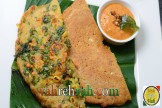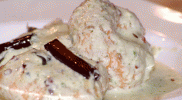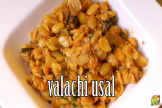
Mix Veg Adai is a South Indian specialty popularly prepared in Tamil Nadu and Kerala for ...
Barley, a member of the grass family, is a major cereal grain. Soup prepared with barley ...

Dahi vada (lentil dumplings) is a popular Indian chaat, prepared by soaking vadas in thic...

Valachi usal is a curry prepared with the “Val” pulses or more generally known as the Bro...
Chana and cabbage dal is a delicious Maharashtrian dish served with rice and roti....

Rasam is an aromatic South Indian recipe which is usually had along with white rice. It ...
Tomato Pappu is an integral dish of every day Andhra vegetarian food. This dish is very simple, earthy and a soulful food. Tur dal or Kandi Pappu with tomato is a winning combination and addition of fresh coriander adds a perfect touch. Pappu in telugu is known as the dal.
Dal is just one of most essential elements that I really like eating with hot rice. Dal is additionally one of several popular pulses generally prepared in each and every house in South Asian countries. I like preparing dal specifically providing an outstanding tempering or tadka to the dal because it astonishingly reveals the taste and flavor that produces our palate salivate and desire to consume much more. Actually, tempering is a crucial p... Read More..
About Recipe
Tametokai pappu, Takkali pazham paruppu, Toamaatar Daal |
|||||||||||||||||||||||||||||||||||||||||||
|
|||||||||||||||||||||||||||||||||||||||||||
Dal is just one of most essential elements that I really like eating with hot rice. Dal is additionally one of several popular pulses generally prepared in each and every house in South Asian countries. I like preparing dal specifically providing an outstanding tempering or tadka to the dal because it astonishingly reveals the taste and flavor that produces our palate salivate and desire to consume much more. Actually, tempering is a crucial part in cooking Indian food. Tempering is virtually provided to a lot of the recipes straight from easy chutney to preparing many different dals or curries or gravies.
Dal is quint basically prepared nearly in each and every Indian home regular that is often offered with rice, roti or chapatti. Dal may also be spelled in lots of ways such as the “Dahl”, “Daal”, “Dhal”, or even the “Parippu”, “Paruppu” and “Pappu” as a result of broad ethnic traditions and diverse dialects that we've in the Country.
Dal is actually a preparation of pulses that have been removed of the outer shell and split. Dals will also be frequently accessible such as the whole pulses referred to as sabut dal or even the split dal referred to as dhuli dal. The hulling of the pulse would be to enhance digestibility and palatability. There are actually more than 50 varieties of pulses in India & Pakistan. Dal is ready just like a thick stew with moderate spices or herbs and seasoned with fresh curry leaves and cilantro leaves to provide a natural taste.
Dal is lower in fat and high in protein, fiber and healthful. To list some of the common dals cooked at each and every household include the:
Masoor dal (red dal) - They are skinned and split lentils. They're salmon colored, cooks easily and turn soft and golden.
Toor dal (yellow dal) - A complete lentil, yellow colored having a tan jacket but they are generally skinned and split. They're moderate and also have a nutty flavor. Tur Dal is an extremely crucial ingredient in preparing dal for the everyday meal such as Plain dal, Sambar as well as found in preparation of Rasam.
Urad dal (black dal or white dal) - A rich and creamy white lentil like beans possessing a black skin outer shell on top of it, accessible as a whole or split dal. Split dal is generally useful for seasoning the curries/ gravies. This can be used to make the well-known tiffin across the country referred to as “Idli”. To have a tender and fluffy Idli, it's always best to use a whole dal.
Moong dal (green gram) - The dal is green in color and it is utilized to make a lot of preparations such as the Pesarattu (also referred to as green Dosa), pakoda and many others. This can be soaked overnight and sprouted. The sprouted dal can be used in preparing salad or also eaten uncooked. It's extremely healthy in addition to a low calorie food. The skinned and split dal can also be referred to as dhuli moong plus they are flat, yellow colored and incredibly fast and easy to make. They are not at all hard to digest as well.
Channa dal - Small, splited, size of a half chickpea, dull yellow colored having a sweet and nutty flavor. Probably the most common dal in India used mostly in seasoning and lots of other types of food. Cooked Channa dal usually leads to flatulence, therefore Indian attempt to counter with the addition of asafoetida to dish.
Rajma - Typically referred to as Red Kidney Bean around the globe. Usually prepared in Northern India and often offered with rice (referred to as Rajma-Chawal). Rajma can also be prepared in onion tomato gravy with spices and it is tangy to taste. Red Kidney bean is loaded with iron, potassium, thiamine, vitamin B6, folic acid and it has quite high starch, protein and dietary fiber.
Black eyed peas are fantastic way to obtain calcium, folate and Vitamin A amongst other nutritional value and high in nutrition. Included in the Jewish New Year traditions, it's believed that consuming black eyed peas provide success and good luck. Black eyed bean is very common in the west particularly South America and it is generally found in Indian cooking.
Preferred recipes prepared using the Dals consist of: Idli, Dosa, Vada, Dal Makhani, Moong Dal Vada, Pesarattu, Tadka dal, Dal curry recipe, Dal Bhaati, Palak Dal and many others.


Jenessa Cordes Posted on Fri Aug 16 2013
Made this for my fiance tonight (he's from AP) and he LOVED it! Here's my silly blog which I made a few other Indian dishes. Check it out! tequilaandcheezits.wordpress(dot)com enjoy :)
Reply 0 - Replies
Pa Chino Posted on Sun Aug 18 2013
It wasn't that easy! I am single guy who is try to cook indian food but simple.
Reply 0 - Replies
ANN N Posted on Thu Sep 12 2013
WHY DO U TELL STORIES BEFORE START DOING RECIPES .
Reply 0 - Replies

ramaraksha01 Posted on Sun Jan 26 2014
He just says boiled Dal - how do you get there - remember we are talking novices here - if i put this dal on the stove add water - how long will it take for the dal to boil? Anyone??
Reply 0 - Replies
smitha k Posted on Sun Mar 09 2014
Initial you added cumin seed, curry leaves n later why again we need to add same ingredients for tampering? we can skip in initial right chef? ?
Reply 0 - Replies



patha. shirish kumar Posted on Mon Jul 28 2014
this vidio food we prepar in my house is not good very bad?
Reply 0 - Replies Easy recipes
Easy recipes
 Healthy Recipes
Healthy Recipes
 Dessert Recipes
Dessert Recipes
 Mutton and Lamb
Mutton and Lamb  Indian Bread Recipes
Indian Bread Recipes
 Dal Recipes
Dal Recipes
 Chutney and Pickles
Chutney and Pickles  Indo-Chinese Recipes
Indo-Chinese Recipes
 Snacks and Appetizers
Snacks and Appetizers
 Low Fat Recipes
Low Fat Recipes
 Chaat Recipes
Chaat Recipes
 Biryani and Rice
Biryani and Rice  Curry Recipes
Curry Recipes
 Indian Sweet Recipes
Indian Sweet Recipes
 Egg Recipes
Egg Recipes
 Paneer Recipes
Paneer Recipes
 Chicken Recipes
Chicken Recipes
 Indian tiffins
Indian tiffins
 Egg less Recipes
Egg less Recipes
 Soups and Salads
Soups and Salads
 Indian Sea Food
Indian Sea Food
 Manchurian Recipes
Manchurian Recipes
 Indian Drinks Recipes
Indian Drinks Recipes
 Dinner Recipes
Dinner Recipes
GAUTAM ADHIKARI Posted on Tue May 22 2012
Reply 0 - Replies